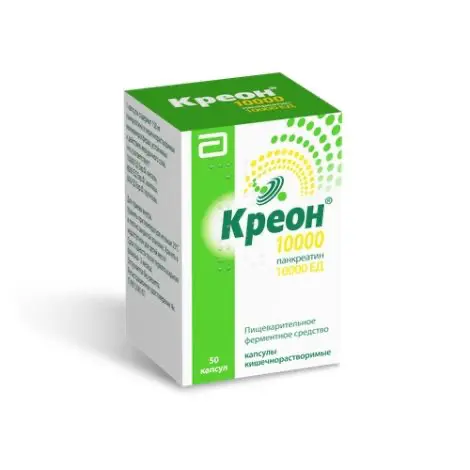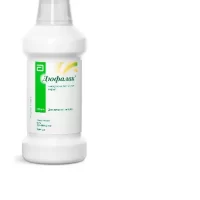Description
Creon Pharmacodynamics
Enzyme preparation improving digestion processes in adults and children, thus considerably reducing symptoms of pancreatic enzyme insufficiency, including pain in abdominal area, flatulence, change in frequency and consistency of stools. Pancreatic enzymes contained in the drug facilitate digestion of proteins, fats, carbohydrates, which leads to their complete absorption in the small intestine.
Creon® 10000 contains porcine pancreatin in the form of minimicrospheres, covered with an enteric soluble (acid-resistant) coating, in gelatin capsules. The capsules dissolve rapidly in the stomach, releasing hundreds of minicrospheres. This principle is designed to allow for the simultaneous passage (ingestion) of the minimicrospheres with food from the stomach to the intestines and the careful mixing of the minimicrospheres with the intestinal
intestinal contents and, ultimately, a better distribution of the enzymes after their release within the intestinal contents.
When the minimicrospheres reach the small intestine, the intestine-soluble membrane is rapidly degraded (at pH > 5.5), and enzymes with lipolytic, amylolytic and proteolytic activity are released, leading to the breakdown of fats, carbohydrates and proteins. The resulting substances are then either directly absorbed or further broken down by intestinal enzymes.
Indications
Substitution therapy for pancreatic exocrine insufficiency in children and adults due to various gastrointestinal diseases, most commonly seen in:
– cystic fibrosis;
– Chronic pancreatitis;
– After pancreatic surgery;
– after gastrectomy;
– pancreatic cancer;
– partial resection of the stomach (e.g., Bilroth II);
– pancreatic duct or common bile duct obstruction (e.g., due to a neoplasm);
– Schwachman-Daimond syndrome;
– condition after an attack of acute pancreatitis and resumption of enteral or oral nutrition.
To improve digestion in patients with normal gastrointestinal function in cases of poor nutrition (fatty foods, overeating, irregular meals, etc.)
Contraindications
Hypersensitivity to the active substance of the drug or to any excipient.
Usage during pregnancy and lactation
Pregnancy
There are no clinical data on treatment of pregnant women with preparations containing pancreatic enzymes. Animal studies have not revealed absorption of pancreatic enzymes of porcine origin, so toxic effects on reproductive function and fetal development are not expected.
The drug should be administered to pregnant women with caution if the estimated benefit to the mother exceeds the potential risk to the fetus.
Breast-feeding period
On the basis of animal studies, during which no systematic adverse effects of pancreatic enzymes have been revealed, no harmful effects of the drug on the infant through breast milk are expected.
Pancreatic enzymes can be taken during breastfeeding. If it is necessary to take the drug during pregnancy or during breast feeding, it should be taken in doses sufficient for maintenance of adequate nutritional status.
Dosage and administration
- Orally.
- Doses of the drug adjusted individually depending on the severity of the disease and the composition of the diet.
- Capsules should be taken during or immediately after each meal (including snacks), swallowed whole, do not break or chew, drinking plenty of fluids.
- If swallowing is difficult (e.g., in young children or elderly patients), the capsules are carefully opened and the minimicrospheres are added to soft foods that do not require chewing and have an acidic taste (pH < 5.5) or taken with liquids that also have an acidic taste (pH < 5.5). For example, minimicrospheres can be added to apple puree, yogurt or fruit juice (apple, orange or pineapple) with a pH less than 5.5. It is not recommended to add the contents of the capsules to hot food. Any mixture of minimicrospheres with food or liquid should not be stored and should be taken immediately after preparation.
- Crushing or chewing the minimicrospheres or mixing them with food or liquids with a pH greater than 5.5 may destroy their protective, enteric soluble coating. This can lead to early release of enzymes in the mouth, reduced efficacy, and irritation of mucous membranes. It is important to make sure that no minimicrospheres remain in the mouth.
- It is important to ensure adequate continued fluid intake by the patient, especially if there is increased fluid loss. Inadequate fluid intake may cause or exacerbate constipation.





